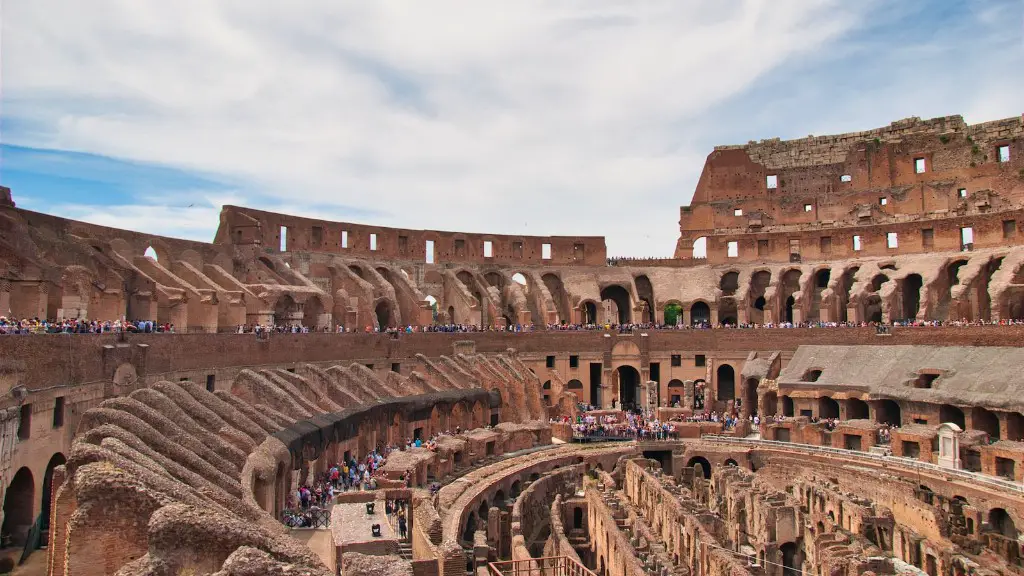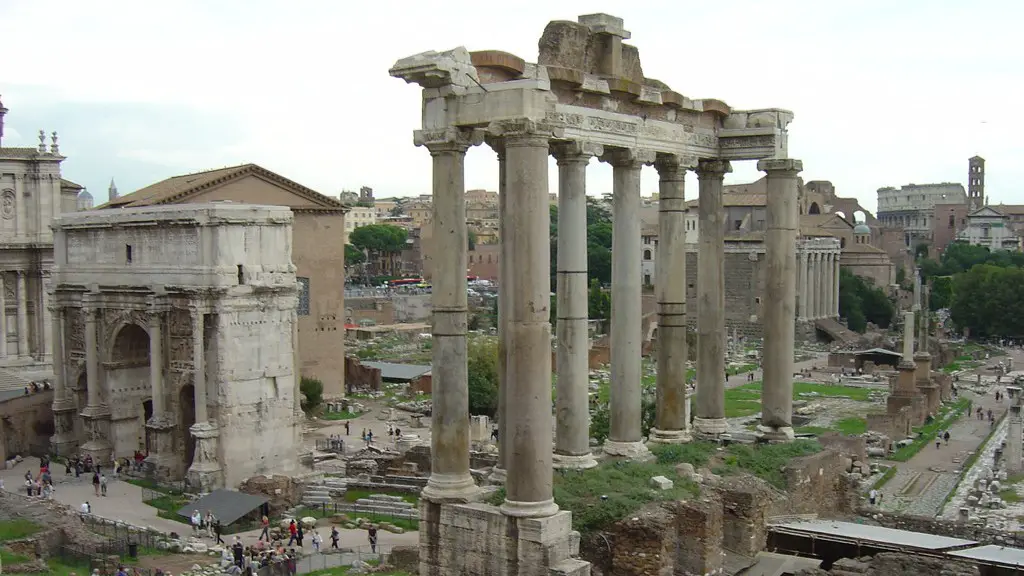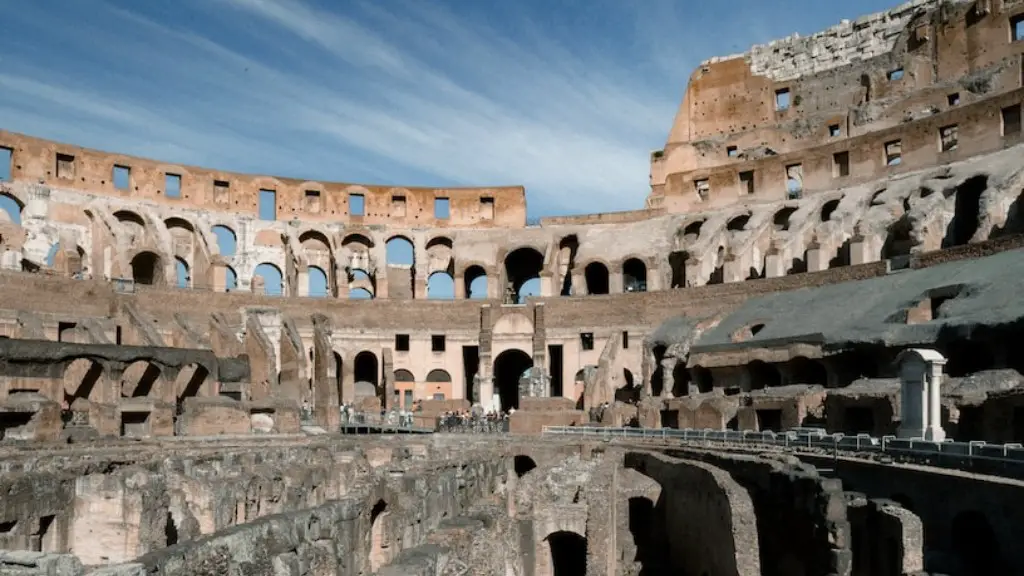Ancient Rome was a complex and ever-changing society made up of different types of citizens. Although many people think of Rome as a city-state, it had a population of several million people – larger than any Greek city-state. At any one time, the Roman citizens included patricians, equites, freedmen and slaves. They were the ones who had the right to vote and had certain privileges in both Roman and international law.
The patricians were the most privileged citizens in Roman society. They were the descendants of the earliest Roman citizens, who were part of the original ruling class of Rome. They had exclusive rights to hold public office and were the most powerful land-owners. Despite the fact that these rights were slowly eroded over the years, they were still the most privileged class of people in Roman society.
The equites were the middle class of citizens – the class of merchants, traders and land-owners. While they were not as powerful or privileged as the patricians, they still held prominent and influential positions in Roman society. They had a right to vote and to enter the Senate, and their businesses and holdings often made them very wealthy.
Freedmen were citizens who had formerly been slaves. They were usually former slaves of wealthy Roman households who had earned or been granted their freedom. Though they lacked the same rights as patricians and equites, they were still considered citizens of Rome and had certain privileges, such as the right to marry, own their own homes, and pursue certain careers.
Lastly, there were slaves. Slaves had no rights and were considered property, although some of them did manage to earn their freedom. Despite this, they were still considered citizens of Rome, albeit without any of the privileges of other Roman citizens. They did, however, have the ability to purchase their freedom, and some of them managed to do so.
Families and Social Status
Families were very important in Roman society, and they often held high social status. All citizens had the right to marry and start their own families. Marriage was not only seen as a way to start a family, but also a social status symbol. Patricians were usually married to patricians and equites usually married equites, while freedmen and slaves could not marry patricians or equites.
Apart from families, another way to gain social status in Roman society was through patronage. Patrons were wealthy and influential people who provided protection and patronage to lower status citizens in exchange for loyalty. This patronage could take the form of financial and even legal assistance. It was considered a form of honour to be a patron, and those who received patronage could then use it to gain greater political influence.
Citizenship in ancient Rome was largely dependent on social status and wealth. Being a wealthy patrician, equite or freedman was seen as a source of prestige. Slaves, however, were essentially excluded from many aspects of Roman society and were not considered citizens. Granted, a few of them managed to gain their freedom and become citizens, but for the most part slaves were excluded from the rights and privileges of being a Roman citizen.
Roman Citizenship and The Roman Empire
The Roman empire was massive and included many lands throughout the Mediterranean and Europe. As the Roman empire expanded, so too did the rights and privileges of its citizens. Roman citizens living in the provinces had many of the same rights as Roman citizens living in the city-state of Rome, though there were some subtle differences. Roman citizens living in the provinces had the right to vote for provincials councils, trade freely, and own property. They also had the right to appeal to Rome in the event of an injustice.
Roman citizenship was also instrumental in the expansion of the Roman Empire. Since Roman citizens had the right to serve in the military, they could be sent to the provinces to fight in wars and help maintain control of the provinces. In return, the territories they helped to conquer were granted Roman citizenship, ensuring that they were loyal to the Roman state and could be held accountable to Roman law.
Effect of Roman Citizenship on Other Cultures
The expansion of Roman citizenship throughout the empire had a huge impact on the cultures that were conquered by Rome. Many of them adopted some of the Roman customs, such as language and dress, and many of the provinces even adopted Roman law. By granting Roman citizenship to conquered lands, Rome was able to extend its influence to these faraway lands and ensure the loyalty of its new citizens. As a result, the Roman Empire had a lasting effect on the cultures it conquered.
Roman citizenship also had an effect on the economy of the empire. Roman citizens had certain economic privileges, such as the right to trade freely and own property. They also were able to provide economic aid to Rome in times of need, such as wars and invasions. This helped to keep the economy of the Roman Empire stable and prosperous.
Consequences Of Roman Citizenship
The granting of Roman citizenship also had some unintended consequences. With the expansion of Roman citizenship, it became increasingly difficult to keep track of who was a citizen of Rome and who was not. This led to an increase in cases of fraud and abuse, as people tried to take advantage of the system to gain access to the rights and privileges of being a Roman citizen. This led to the initiation of more stringent rules and regulations concerning Roman citizenship.
Roman citizenship also had a significant effect on Roman law. Roman law provided citizens of Rome with certain rights and privileges, but it also placed certain restrictions on them. For example, Roman citizens were not allowed to marry outside of their own social class, and Roman law was very restrictive concerning the ownership of property. These restrictions meant that many of the rights and privileges that Roman citizens enjoyed were not available to people who were not citizens.
Decline of Roman Citizenship
The Roman Empire slowly began to decline, and with it the privileges associated with Roman citizenship. As the power of Rome decreased, so too did the rights and privileges of its citizens. For example, the right to hold public office and to appeal to Rome was slowly curtailed. Roman citizens were also increasingly targeted by the state, as the government attempted to maintain control over its territories.
The spread of Christianity also had an effect on Roman citizenship. Christianity included a set of principles that were in direct opposition to many of the rights and privileges associated with Roman citizenship. This led to a decrease in the importance of Roman citizenship, as religious ideology began to overtake the traditional system of Roman law and privileges.
Relationship Between Roman Citizens and Slaves
The relationship between Roman citizens and slaves was one of the most controversial aspects of Roman society. Roman citizens enjoyed a variety of rights and privileges that were denied to slaves, and the difference in their societal positions was quite noticeable. Despite this, some slaves were able to earn their freedom, and even become Roman citizens. However, for the most part, the relationship between Roman citizens and slaves was based on exploitation, and this has had lasting repercussions throughout history.
Though slavery no longer exists in many parts of the world, the legacy of Roman citizenship and the social caste system it created still impact society today. Roman society was based on a system of inequality, which was accepted and expected by the majority of its citizens. In many ways, this is still the case today, as certain rights and privileges are reserved for citizens with more money and power.
Despite the inequality and unfairness that was inherent in the system of Roman citizenship, it still had a huge impact on the world. The Roman Empire may have been one of the most powerful empires in history, but it was also one of the most just and equitable. The rights and privileges that were granted to Roman citizens helped to shape the world we live in today, and continue to be a source of inspiration for people around the world.




